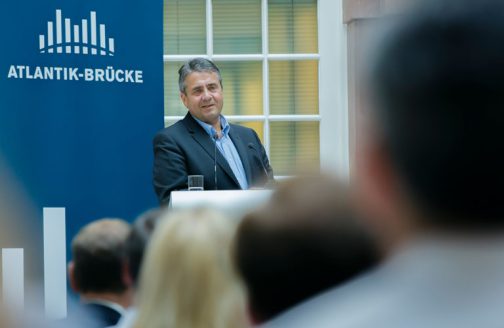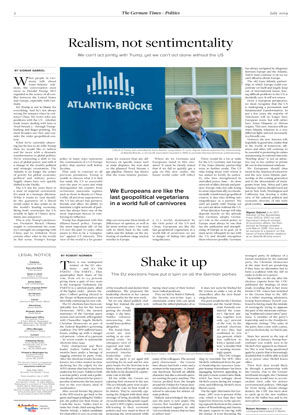Realism, not sentimentality: We can’t act jointly with Trump, yet we can’t act alone without the US

When people in Germany talk about trans-Atlantic relations, the conversation soon turns to Donald Trump. He’s regarded as the source of all conflict between the United States and Europe, especially with Germany.
Yet Trump is not to blame for everything. And he’s not always wrong, for instance when he criticizes China. We won’t solve any problems with the US – whether trade issues, dealing with Iran or Nord Stream 2 – through Trump-bashing and finger-pointing. We must broaden our view and consider the wider geopolitical context.
What we’re currently observing has far less to do with Trump than we would like to believe and far more with a dramatic transformation in global politics. We’re witnessing a shift in the axes of global power, and with it a change in the world’s political and strategic orientation. The Atlantic is no longer the center of gravity for global economic, political and military power. Supply chains have very quickly shifted to the Pacific.
The US has for years been in a state of imperial overstretch. It’s stuck in a strategic dilemma. While it wants to (and should) be the guarantor of a liberal world order, it also wants to be the world’s leading economy. Being both overstrains the US, notably in light of China’s dynamism, size and power.
This is why Trump’s predecessor, President Barack Obama, sought to concentrate his country’s strength on competing with China and to withdraw from certain other roles in the world. In this sense, Trump’s foreign policy in many ways represents the continuation of a US foreign policy that started well before his time.
That said, in contrast to all previous presidents, Trump is unable to discern what it is that has made the US so successful over the past 70 years and what distinguishes the country from revisionist, autocratic regimes such as those in Russia or China. Unlike all previous superpowers, the US has always had partners, friends and allies. Its ability to maintain a tight network of partners has always been one of the most important factors in reinforcing its influence.
Trump has dispensed with this alliance-based policy. Europe, the most important ally of the US over the past 70 years, often seems to him to be a “conspirator” against US interests. This view of the world is a far greater cause for concern than any differences on specific issues such as trade disputes, the Iran deal or the planned Nord Stream 2 gas pipeline. History has shown that the trans-Atlantic partnership can overcome these kinds of differences of opinion, as well as far more serious ones. One need only to think back to the early 1980s and the debate on the stationing of medium-range nuclear missiles in Europe.
Where do we Germans and Europeans stand in this situation? It must be clearly stated that if we fail to quickly get a grip on this new reality, the future world order will reflect a G-2 world, dominated by the twin poles of the US and China. Europeans are like the last geopolitical vegetarians in a world full of carnivores; we are in danger of fading into global insignificance.
There would be a lot at stake for the US, Germany and Europe if the trans-Atlantic partnership were to further erode. The US risks losing those with whom it has united to fortify its authority, who have strengthened its unrivalled power base – its close network of allies, friends and partners. Europe risks not only losing its most important ally; in a fundamentally transformed geopolitical context, it also risks drifting into insignificance as a partner. We can’t act jointly with Trump, yet we can’t act alone without the US.
What direction Europe will take depends heavily on the attitude that Germany adopts. Germany’s role as the central power in Europe must always be one that has the unification and strengthening of Europe as its goal, yet it must never relinquish its ties with the US and should strengthen them wherever possible. Germany has always navigated its allegiance between Europe and the Atlantic. And it must continue to do so; we can’t afford to divide Europe.
The old trans-Atlantic partnership, in which Europe could concentrate on itself and largely keep out of international issues, leaving difficult problems to the US, is decidedly over. It will not return.
From a European perspective, we must recognize that the US is undergoing a permanent and fundamental transformation. In just a few years, the majority of Americans will no longer have European roots, but will rather have Asian, Hispanic or African origins. This new America will see trans-Atlantic relations in a very different light, and not necessarily in a friendly one.
However, the new America will, hopefully in good time, realize that in the world of tomorrow, alliances and allies will continue to be essential in protecting its values and pursuing its national interests. “Bowling alone” is not an attractive way to live, neither in private life nor in international relations.
We Europeans should thus invest in the America of tomorrow and the new trans-Atlantic partnership, in the coming generation and in the descendants of immigrants from Asia, Africa and Latin America. And we should travel not just to New York, Washington and California, but develop a wider view of the cultural, political and economic diversity of this truly great country.
Sigmar Gabriel
is an SPD member of the Bundestag. From 2013 to 2017, he was Germany’s federal minister of economic affairs. He then served as foreign minister until March 2018. This text is an excerpt of a speech on the future of trans-Atlantic relations at an Atlantik-Brücke event.




